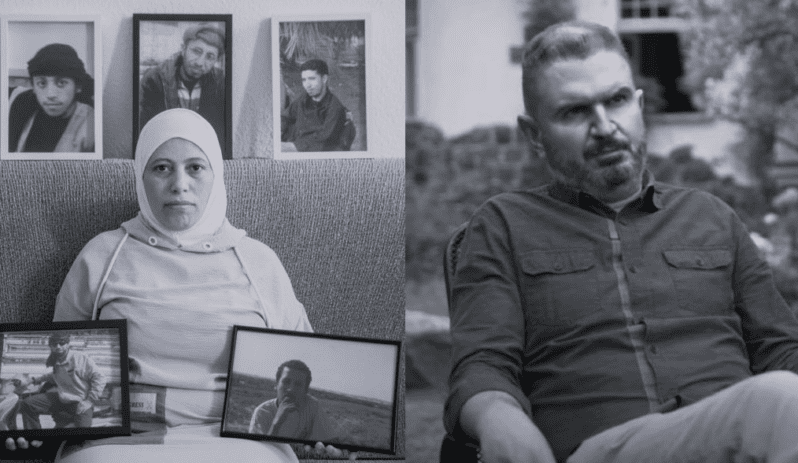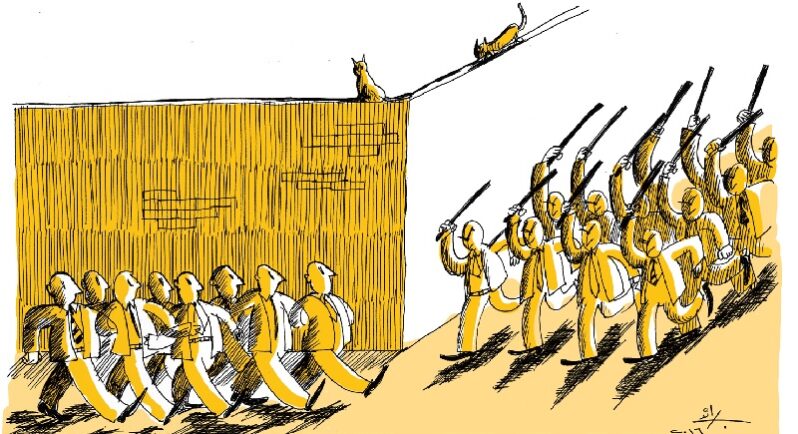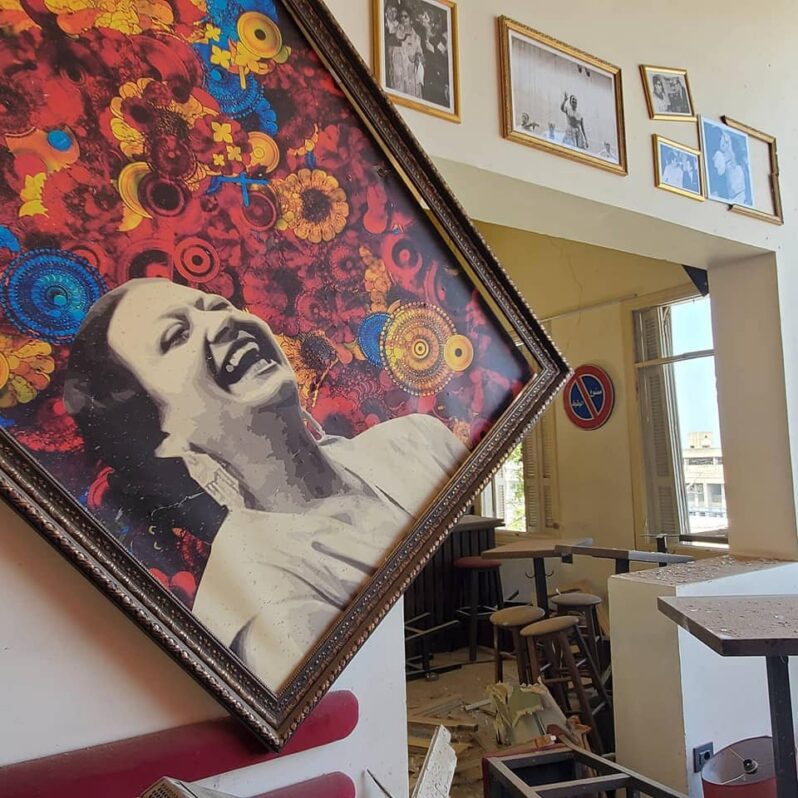Dual Citizens in Libya: A New Tool of Political Isolation?

After the Libyan revolution, many opponents of the former regime returned to the country and assumed positions of authority. This caused the issue of dual citizenship, which had not previously been a familiar one in Libyan society, to rise to the surface. Most members of the opposition with dual citizenship acquired it while living in the countries of the diaspora. During the initial rush of the revolution and the start of the transitional period, the issue was not of great importance; indeed, many of these individuals were viewed as freedom fighters and nationalist figures.
However, with the intensification of the political conflict following the repeated failures of most of the successive political and executive authorities to carry out their functions, popular demands began to emerge; particularly, on social media calling for the prevention of dual citizens from running for election, or being appointed to public office. Gradually the expression “dual SIM” (i.e., two faced), emerged and spread in popular usage. The phrase refers to an official that holds dual citizenship, and indicates doubts about his loyalty implying that he may return to the diaspora upon leaving office.[1]
What is striking is that not a single one of the election laws issued after the revolution forbids dual citizens from running for election; they only state that one must hold Libyan citizenship to do so. This was made clear in the law governing the election of the General National Congress, issued by the National Transitional Council, as well as the laws governing the elections of both the Constituent Assembly for Drafting the Constitution and the House of Representatives, issued in turn by the General National Congress.[2][3] These laws reflected the positive attitudes towards dual citizens that were dominant at the time, given also that the bodies issuing these laws included a number of dual citizens. Subsequently, a number of dual citizens won seats in the legislature and began serving their political and executive functions.
In January 2016, a second draft [of the Constitution] was issued by a working group made up of members of the Constituent Assembly, the body responsible for drafting the Constitution.[4] This draft took up the issue of nationality in Articles 12, 13, and 14, which permit a Libyan to acquire another citizenship and prohibit the revocation of [Libyan] citizenship for any reason. Regarding the conditions for running in presidential elections, the draft [Constitution] stipulated that a candidate could not hold a second citizenship unless it had been relinquished at least five years prior to running for president.[5] It likewise stipulated that candidates for both chambers of parliament must not obtain a second citizenship. This reflects a shift in the public mood and a difference in the perception of dual citizens, leading to an attempt to exclude them from positions of power while acknowledging the remainder of their rights as citizens.
Against the background of this situation, a judicial ruling was issued on February 15, 2016 by the summary section of the administrative judiciary of the appeals court in al-Bayda. The ruling called to suspend, in part, a decision made by the High National Elections Commission (No. 55 of 2014) to confirm the election results for the Constituent Assembly. Specifically it called to invalidate the recognition of Ali Abdussalam Tarhouni as a member of the Constituent Assembly.[6] The court ruling also called to suspend the Commission’s recognition of Tarhouni’s selection as president of the Assembly. Constituent Assembly member Daou al-Mansouri and other citizens presented the appeal, challenging the recognition of Tarhouni’s membership (and his election as the body’s president) on the grounds that he carried a second citizenship and he was married to a foreigner.[7]
This appeal took place despite the fact that the specified period for appealing election results for the Constituent Assembly had ended. Since 2014, the Constituent Assembly had begun carrying out its tasks, forming committees, and issuing its rules of internal procedure, thereby establishing its legal status in accordance with the [Elections Commission’s] now-contested ruling.[8] Once the High National Elections Commission learned of the February 22, 2016 ruling, however, its administrative council decided to suspend its recognition of Tarhouni in accordance with the judicial ruling.
This ruling is important in terms of both its various dimensions and its timing. It therefore calls for an in-depth reading not only from a legal perspective, but also, crucially, in terms of its political dimensions and the implications it holds for the relationship between the judiciary and politics.
Reading the Ruling from a Technical Legal Perspective
Although the court’s ruling is a temporary one, and therefore not definitive, the issuance of a ruling in connection with Tarhouni’s recognition indicates that the court considered the appeal to be founded upon significant reasons, and that expediency was warranted. Should the court ruling be upheld after the Assembly –headed by Tarhouni– adopts the draft Constitution, serious problems will emerge. For how can the Constituent Assembly produce a constitution and present it for referendum in the case of a defect, or falsity in the election of one of its members, and his selection as the body’s president? Such a situation could conceivably be damaging to both public and private interests. I present below a number of observations on this matter, building upon the context of the arguments presented by the court.
The Court’s Jurisdiction
Regarding the court’s jurisdiction, it declared that the election law only stipulates an appeals mechanism for preliminary election results, over which a criminal judge holds jurisdiction. However, no appeals mechanism is specified concerning final election results, which therefore fall under the jurisdiction of the administrative judiciary.[9] This opinion is based on the general rules governing the appeals of administrative decisions.[10] The court held that the Constituent Assembly’s decision to elect Tarhouni as president constituted an administrative decision, and therefore fell under the jurisdiction of the court which had the authority to rule on it.
However, this interpretation was subject to criticism. Even if we assume that there were legislative shortcomings in the election law regarding how appeals of final election results should be handled, addressing such shortcomings requires research into the likely intentions of the lawmakers, and the intended legislative rationale behind the law. This is evident, for example, in the legislation’s directives regarding expediency and speed in the section on election appeals, in view of the consequential nature of election results.
Note that Article 29 of the elections law, which regulates the electoral appeals mechanism, devotes an entire section to stipulating that all voters and candidates have the right to appeal the candidate or voter lists as soon as they are published, should they not meet the conditions and regulations mandated by law. These conditions include holding Libyan citizenship. This means that it would have been possible to appeal Tarhouni’s candidacy as soon as the lists were published; specifically, during a specified three-day period. Candidate lists are also to be announced sufficiently in advance of the start of election procedures, which did not occur [in this case].
Reinforcing this reading is the fact that recent legislation in connection with election procedures has mandated a period in which electoral appeals can be made by way of a swift and timely procedure that would determine the legal consequences, and establish permanent and ongoing legal statuses that could then only be changed through further electoral procedures; this has implications for both public interest and the stability of state institutions.
Justifying Exceeding the Appeal Period
The court sought to justify the delay of the appeal against possible objections to its timing. The appeal was made approximately 22 months after the date that the High National Election Commission recognized Tarhouni’s election, and 21 months after his selection as president of the Constituent Assembly. This exceeded the appeals period for administrative decisions, which is sixty days.
In order to justify this, the appeals court of al-Bayda explained that it had not been in session until December 1, 2015, which created a material obstacle to hearing appeals. In situations such as this, the court is obligated to allow appellants another opportunity to compensate for the period during which they had been prevented from presenting an appeal; it was during this [additional] period that the litigation took place. Nonetheless, this justification was criticized from the standpoint that it would have been possible for the appellants to resort to the administrative judiciary sections of other appeals courts that had been in session, and which had jurisdiction. Such courts include those in Tripoli, Misrata, Khoms, and others.
On the Significance of the Appeal in the Context of Dual Citizenship
Perhaps the most important observation concerns what the judicial ruling states implicitly. Article 5 of Law 14 of 2010 which contains provisions regulating Libyan citizenship, stipulates that a person “loses Libyan citizenship” if they “acquire, by their choice, a foreign citizenship, [and] if they are not granted permission to do so by the General People’s Committee of Public Security; the implementing regulations of the rules regarding the enforcement of these provisions are specified in this article”.
On one hand, it is unacceptable to revoke a dual citizen’s original citizenship without giving them the opportunity to maintain it. Although the 2010 citizenship law is silent on this subject, it can be seen clearly in the previous law on citizenship, namely, law 18 of 1988. This older law places conditions on the instigation of the loss or forfeit of a person’s citizenship; an explanation must be issued by the General People’s Committee following a review by the General People’s Committee of Justice.[11] Citizenship, therefore, is a matter that legislation covers with specific guarantees. The matter of losing or revoking citizenship has been set in law by the legislature, and it is not possible to deny or revoke citizenship in a manner contrary to the procedure specified by law.[12] The second draft of the Constitution, as explained above, went so far so as to ban the revocation of one’s original citizenship.
On the other hand, there are many possible interpretations given of the citizenship law given that no implementing regulations have been issued. The first interpretation points to the impossibility of implementing this article. Most members of the opposition had been persecuted by the regime; how could they possibly request prior permission to acquire foreign citizenship status, where they sought refuge, from the security apparatus of the regime they had fled?[13] The second view is that this obstacle persisted even after the revolution, and that it was incumbent upon the individuals in question to approach the proper authorities to undertake the necessary procedures.[14] A third view considers the silence on the part of the relevant authorities on any related measures as a negative attitude regarding the administration’s acceptance of the acquisition of an additional citizenship. An additional view goes further, and cannot conceive of punishing the former political opposition for carrying an additional citizenship in accordance with laws and penal procedures that predate the revolution; put into place for political reasons, these laws no longer stand, according to this view.[15]
Finally, it must be pointed out that on May 6, 2015, the [Ministry of Justice’s] General Legal Administration issued a legal ruling declaring that anyone who acquires foreign citizenship by their own volition and choice, or who marries a foreigner, is deemed to lack the qualifications necessary to be appointed as a public servant – and those qualifications include holding Libyan citizenship.[16]
The Judiciary and Politics
Of course, the ruling’s implications are not limited to its legal dimensions: rather, they take us into the hallways of politics and the corridors of power. The ruling goes to the heart of an issue of profound sensitivity and controversy, and is connected to many of the state’s political posts. Since the start of the revolution in 2011, many dual citizens have been appointed to political positions of power within the state. Among them are [Tarhouni] the subject of the appeal, who held the position of minister of finance and deputy prime minister.[17] They also include Ali Zeidan, who was appointed to the position of prime minister in 2012, and holds German citizenship – which requires a person to give up their prior citizenship. Similarly, Mohamed al-Magariaf was appointed as president of the General National Congress, the first parliament elected after the revolution, in 2012; he holds the American citizenship. There are many others in ministries, embassies, and amongst the members of parliament, as well as amongst the members of the Constituent Assembly itself. They were all appointed to their posts without the issuance of any new legislation or judicial rulings preventing them from taking these positions.
Thus, one of the ruling’s most important dimensions is that it furnishes those who wish to exclude their political opponents in an intensely polarized political situation with a new weapon. As a consequence, the courts may see numerous cases that challenge the appointment of dual citizens to particular positions in the absence of implementing regulations for the citizenship law.
This ruling, moreover, is not the first judicial ruling to impact the public political scene. Three other rulings in particular are worth mentioning:
The administrative judiciary ruling on Appeal 93/2012, issued on May 15, 2012. This halted the implementation of a decision regarding the formation of the High National Elections Commission prior to the date that had been set for holding elections, compelling the National Transitional Council to issue a new law revising the composition of the Commission.
The ruling voiding the appointment of Ahmed Omar Maiteeq as prime minister. This ruling was issued by the constitutional chamber of the Supreme Court on June 9, 2014. It ruled that Decree 38 of 2014, issued by the General National Congress on May 4, 2014, was unconstitutional.
Finally, the most well-known and influential of these rulings in terms of the political and legislative scene was a Supreme Court ruling issued on November 6, 2014. It addressed Appeal No. 17 of Judicial Year 61, regarding Section 11 of Article 30 of the constitutional declaration, which had been modified in accordance with the 7th constitutional amendment of March 11, 2014. This ruling effectively nullified the proposals of the February committee, which had included the recognition of the election of the House of Representatives. It also brought about a split in the legislature: on the one hand, the General National Congress returned to power in the west of the country, even though its session had ended; on the other, the elected House of Representatives continued to function in the east.
The significance of this ruling became clear in light of its effects on the work of the Constituent Assembly and the resulting consequences for the political situation more generally that followed. Likewise, the ruling issued on February 15, 2016 prevented the Assembly from presenting its final draft [of the Constitution] by the date specified in the Libyan Political Agreement, which had been set as March 24, 2016.[18] While the Agreement was not adopted by the House of Representatives as a constitutional amendment, it does constitute, at the very least, a moral obligation.
In other words, voiding the appointment of the president of the Constituent Assembly could lead to the nullification of its work as a whole, particularly given the difficulties of agreement upon an alternative president in light of the current alarming state of conflict among its members; particularly, between members currently boycotting the body and those who are still participating, and their differences over some crucial constitutional provisions. It is this jeopardization of the constitutional process that is prompting many to criticize the ruling and its timing. Among the most distinguished of those critics is the former head of the Libyan Bar Association, Abdul Hafiz Ghoga. The latter has expressed regret that the appellant built a case on his own personal interest, namely, that recognizing Tarhouni would affect the appellant’s own plan to run for the presidency of the Constituent Assembly, not on the basis of public interest.[19]
Finally, it is worth noting that the repercussions of this ruling are still being felt in the judicial sphere. The appeal has now reached the Supreme Court, which had not concluded its session at the time of this writing on March 20, 2016. Given that the court has not yet ruled on the subject of the lawsuit currently under consideration, the scene is subject to change at any moment. Whatever the consequence of the ruling, it is certain that its effects will not only be judicial and legal, but political and potentially legislative as well. As we await the final outcome of the case, legitimate questions arise given the experience of the Libyan judiciary in the period of instability, and of the continued political and military crises that surround the relationship between the law, the judiciary, and politics. This, of course, is another subject that deserves its own investigation.
This article is an edited translation from Arabic.
__________
[1] The expression “double shafra” is a popular term that came to be used to describe an official with dual citizenship. It came from the idea of mobile phones that carry two SIM cards.
[2] The National Transitional Council was the first consensus-based political authority in Libya after the revolution. It was chaired by Mustafa Abdul Jalil and existed from March 2011 until August 2012.
[3] General National Congress, the first elected authority after the revolution, was elected on July 7th, 2012; see Law No. 17 of 2014.
[4] The working group was made up of 12 members of the Constituent Assembly, and its task was to write the final draft of the Constitution; it finished in January 2016; the draft was not adopted by the Assembly.
[5] Articles 79 and 111 of the draft of the second working group of the Constituent Assembly.
[6] Ali Abdussalam Tarhouni was a politician opposed to the Gaddafi regime; he was living in the U.S. and carrying dual citizenship and married to a foreigner, when he returned to Libya at the beginning of the Libyan revolution.
[7] The reasons for the ruling on the case 5-2016 were published in the pages of the Libyan Judges’ Organization on Facebook at: https://www.facebook.com/504909442859142/photos/pcb.1281371188546293/1281370198546392/?type=3&theater
[8] The site of the High National Elections Commission is: http://hnec.ly/?page_id=7496
[9] Law No. 17 of 2014 on the election of the Constituent Assembly for Drafting the Constitution
[10] Law No. 17 of 2014 on the election of the Constituent Assembly for Drafting the Constitution differentiates between the the preliminary results, announced by the Elections Commission within 48 hours of election day, and without waiting for electoral appeals, and final results, which the Elections Commission must announce within 25 days of the election.
[11] The General People’s Committee was equivalent to the cabinet under the previous regime, and the General People’s Committee for Justice was previously the ministry of justice.
[12] Ruling of the Supreme Court No. 45-118, a group of published rulings of the court.
[13] Opinion of Judge Abd al-Karim Buzaid, published on the Libyan Judges’ Organization’s page.
[14] Opinion of Khalid Zayou, lawyer.
[15] The lawyer and former minister of justice Salah Marghani, in a comment published on the page of the Libyan Judges Organization.
[16] The General Legal Administration is a judicial body that presents opinions and advice regarding administrative issues. Its rulings are not binding. The ruling in question was in response to a question from the Foreign Ministry about the legality of sending an official to work abroad if he held foreign citizenship in addition to Libyan citizenship.
[17] From March 2011 until October 2012, Tarhouni held the position of finance minister, as well as the position of deputy president of the executive office, which is the equivalent of deputy prime minister.
[18] The Libyan Political Agreement was a dialogue to solve the political crisis between the Libyan parties that lasted a year and a half, and ended with signing of an agreement in Skhirat, Morocco, on December 17, 2015. It created an executive council to run the country’s administration, and the agreement was meant to be adopted as a constitutional amendment.
[19] Abdul Hafiz Ghoga, on a facebook page at: https://www.facebook.com/abdelhafid.ghoga?fref=ts



